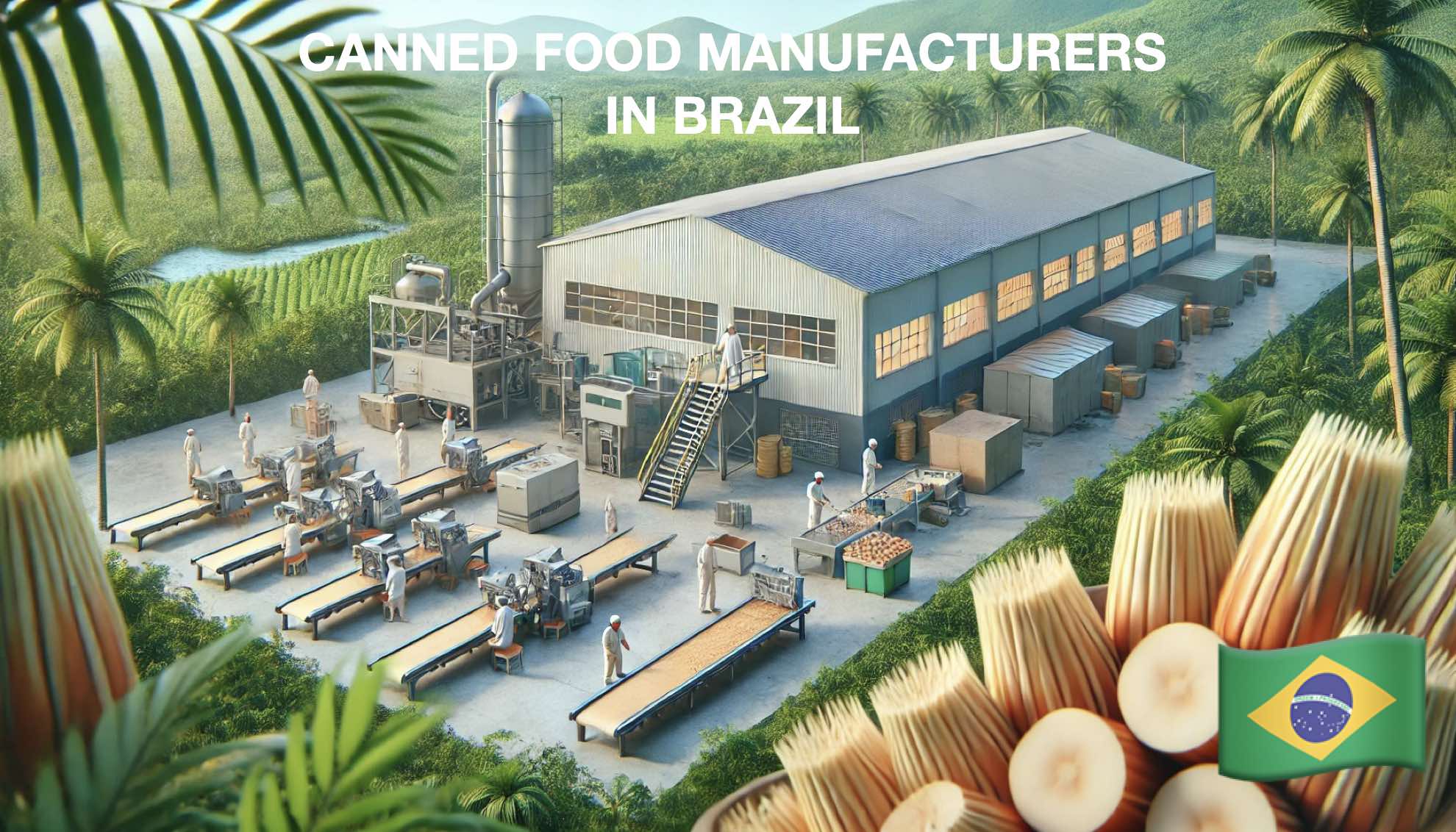 CANNED FOOD PRODUCTION IN BRAZIL
CANNED FOOD PRODUCTION IN BRAZIL
The canning industry in Brazil is a significant sector in the country's agribusiness landscape, focusing primarily on the processing and export of canned fruits, vegetables, meats, and fish. As one of the largest producers of agricultural products globally, Brazil leverages its diverse climate and fertile land to support a strong canning industry, particularly in canned fruits, juices, fish (such as tuna and sardines), and even meats. Here’s a closer look at some key aspects of the canning industry in Brazil:
1.Product Diversity
- Fruits and Vegetables: Brazil’s abundant production of tropical and subtropical fruits (like pineapple, guava, mango, and papaya) and other crops supports a variety of canned fruit and vegetable products. Orange juice, for example, is one of Brazil’s main exports, and though more commonly exported as frozen concentrate, it’s also available in canned form.
- Meat and Poultry: Brazil is one of the world’s largest meat producers, particularly in beef and chicken. The canning industry includes processed meats, often destined for domestic consumption and export, especially in ready-to-eat meals.
- Fish and Seafood: Canned fish products, particularly tuna and sardines, are another strong segment. The country has long coastlines and rich fishing grounds, which support a sizeable industry in canned fish products for local and export markets.
2. Export Market
- Brazil exports a significant amount of canned products, primarily to North America, Europe, and other Latin American countries. The country’s canned fruits and juices, in particular, are in demand abroad. Processed meat and canned fish products are also popular exports, as Brazilian producers look to diversify and add value to their agricultural outputs.
- In recent years, the demand for Brazilian canned goods has grown in Asia and the Middle East, where Brazilian products are viewed as high-quality alternatives.
3. Market Drivers and Growth Factors
- Agricultural Strength: Brazil’s natural resources, including its favorable climate, large arable land, and developed agribusiness sector, create a solid foundation for the canning industry.
- Economic Shifts: Domestic demand for affordable, convenient, and preserved foods has increased due to urbanization and changing lifestyles. Canned foods cater to the growing need for convenient meal options.
- Export Opportunities: Brazil’s agricultural surplus and lower production costs make its canned goods competitive on the global market, especially as other regions experience supply chain disruptions or seek alternative sourcing options.
4. Challenges
- Environmental Concerns: Issues related to deforestation, land use, and water management have raised concerns about sustainability in Brazil’s agriculture sector, which also affects the canning industry.
- Infrastructure and Logistics: Despite improvements, transportation and logistical challenges in Brazil still affect the competitiveness of exports, as some regions face high costs and delays in moving goods to ports.
- Regulatory Compliance: Adherence to international food safety and environmental standards is crucial for export markets, especially in regions like the European Union, where regulations are stringent. This can be a challenge for some smaller players in Brazil’s canning sector.
5. Future Trends
- Focus on Sustainability*: As global markets shift towards environmentally-friendly products, the Brazilian canning industry is increasingly adopting more sustainable practices, like reducing waste and improving energy efficiency.
- Innovation and Value-Added Products: To remain competitive, companies are focusing on higher-value products, such as organic or specialty canned foods, ready-to-eat meals, and healthier options with reduced sodium or sugar.
- Expansion in Emerging Markets: The industry is also eyeing growth in emerging markets, where demand for convenient foods is on the rise, especially in parts of Asia and Africa.
The Brazilian canning industry, therefore, continues to grow, supported by strong agricultural output, expanding international demand, and an increasingly diverse product base. Challenges remain, but investments in sustainability, innovation, and infrastructure are likely to strengthen the industry’s position globally.
La produzione di conserve alimentari in Brasile è un settore industriale importante, specialmente nei comparti di frutta, verdura, carne e pesce. Il paese è uno dei principali produttori agricoli del mondo e sfrutta questa abbondanza per trasformare e conservare molti prodotti destinati sia al mercato interno che all'export. Ecco un quadro del settore:
1. Principali prodotti conservati
- Frutta: La frutta tropicale come mango, papaya, ananas, guava e açaí viene spesso trasformata in conserve, marmellate, polpe e succhi concentrati.
- Verdura e ortaggi: Tra questi ci sono il palmito (cuore di palma), peperoni, olive, e altri ortaggi. Il palmito, in particolare, è una specialità brasiliana esportata in tutto il mondo.
- Carne e pesce: Il Brasile ha una delle più grandi industrie di carne al mondo, con la produzione di carne bovina, suina e pollame in conserve. Anche il tonno e le sardine in scatola sono diffusi.
2. Tecnologie di produzione
- Le industrie brasiliane di conserve alimentari adottano tecnologie avanzate per la sterilizzazione, il confezionamento sottovuoto e la pastorizzazione, garantendo una lunga conservabilità dei prodotti senza l'uso di conservanti artificiali.
- Sono presenti linee di produzione automatizzate che gestiscono il lavaggio, il taglio, la cottura e il confezionamento dei prodotti, come si vede in stabilimenti di produzione di palmito o conserve di frutta.
- Il confezionamento può avvenire in vetro, lattine di metallo, e recentemente anche in imballaggi flessibili e riciclabili per rispondere a esigenze ecologiche.
3. Esportazione e mercati internazionali
- Le conserve alimentari brasiliane sono molto richieste in vari mercati internazionali, specialmente in Nord America, Europa, e altri paesi dell’America Latina.
- Il palmito è una delle conserve più esportate, insieme a prodotti di frutta tropicale e conserve di carne.
- Grazie a regolamenti sanitari e di qualità elevati, molti prodotti brasiliani rispettano le normative dei mercati esteri e ottengono certificazioni come HACCP e ISO.
4. Sfide e innovazioni
- Il settore si trova a fronteggiare sfide legate alla sostenibilità, alla riduzione dell’uso della plastica e alla gestione delle risorse idriche. Alcune aziende stanno investendo in tecnologie per il riciclo dell’acqua e per la produzione a basso impatto ambientale.
- Esiste una crescente attenzione alla produzione biologica e all’uso di ingredienti naturali, dato che molti consumatori preferiscono prodotti senza additivi o conservanti artificiali.
- La sostenibilità e la tracciabilità sono temi in crescita: alcune aziende di conserve stanno sperimentando etichettature che indicano l’origine del prodotto e i metodi di produzione per garantire trasparenza ai consumatori.
5. Impatto economico
- Il settore delle conserve contribuisce in modo significativo all’economia brasiliana, creando posti di lavoro nelle aree rurali e sostenendo l'agricoltura locale.
- Grazie all'abbondanza di materie prime e a un clima favorevole, il Brasile ha un vantaggio competitivo nella produzione di conserve rispetto a molti altri paesi.
Il settore delle conserve alimentari in Brasile, dunque, è diversificato e in crescita, con una combinazione di innovazione tecnologica, attenzione alla sostenibilità, e forte presenza sul mercato internazionale.
If your Company producing canned food in Brazil has been not yet added here, you are able to inform us here.
Estamos atualizando a seção BRASIL fabricantes de conservas alimenticias. Se a sua empresa produtora de alimentos enlatados no Brasil ainda não foi adicionada aqui, você pode nos informar aqui